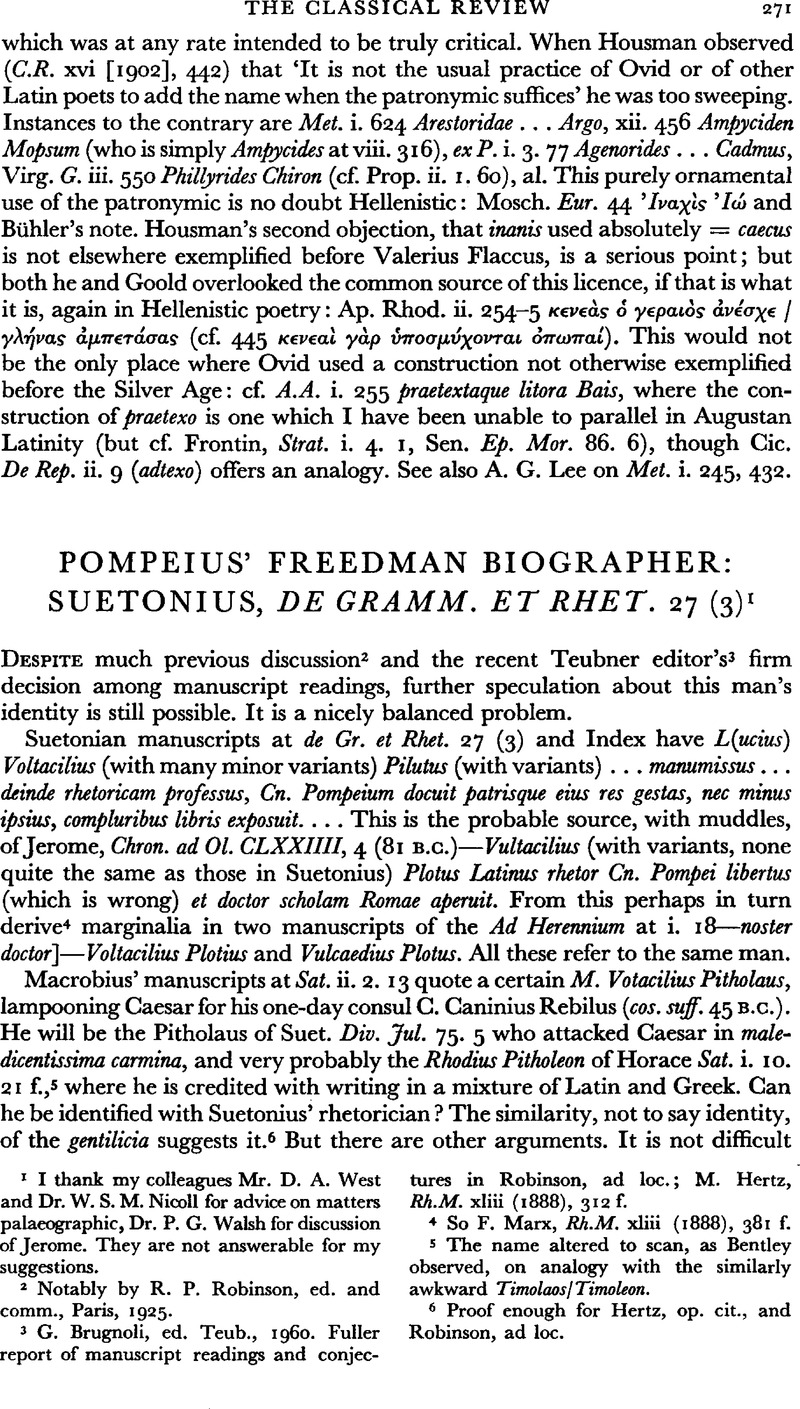No CrossRef data available.
Published online by Cambridge University Press: 27 February 2009

page 271 note 1 I thank my colleagues Mr. D. A. West and Dr. W. S. M. Nicoll for advice on matters palaeographic, Dr. P. G. Walsh for discussion of Jerome. They are not answerable for my suggestions.
page 271 note 2 Notably by R. P. Robinson, ed. and comm., Paris, 1925.
page 271 note 3 G. Brugnoli, ed. Teub., 1960. Fuller report of manuscript readings and conjectures in Robinson, ad loc.; Hertz, M., Rh.M. xliii (1888), 312 f.Google Scholar
page 271 note 4 So Marx, F., Rh.M. xliii (1888), 381 f.Google Scholar
page 271 note 5 The name altered to scan, as Bentley observed, on analogy with the similarly awkward Timolaos/Timoleon.
page 271 note 6 Proof enough for Hertz, op. cit., and Robinson, ad loc.
page 272 note 1 Anderson, W. S., Pompey, his Friends and the Literature of the First Century B.C., Univ. of California Public. in Class. Philol. xiv (1963), 62 f.Google Scholar
page 272 note 2 Pcmpeius visited it twice—Strabo xi. 1. 6; Pliny, N.H.. vii. 112; Cic. Tusc. ii. 61; Fin. iv. 6; Plut. Pomp. 42. 5.
page 272 note 3 Hertz, op. cit., 313 f. was convinced that he had seen inscriptional evidence of parallels published in a ‘French or Italian periodical’, but failed to trace it. It has not since come to light. Schulze, W., Zur Gesch. d. Lat. Eigennamen, 131Google Scholar; 381 accepts Voltacilius, but cites only Suetonius’ rhetorician.
page 272 note 4 Adopted by J. Willis, ed. Teub. 1963.
page 272 note 5 I.L.S.8888;Sisenna fr. 38p; Caesar, B.C.iii. 28; Cichorius, C., Römische Studien, 179 f.Google Scholar
page 272 note 6 I think this better than Hertz's theory that M. is readily corrupted into L. Marcus appears in the family but once, of a priestly envoy in 76 B.C. (Fenestella, fr. 18 p). Cichorius (loc. cit.) adjudges this corrupt, and reads M'. Whence the l in Suetonius' Voltacilius? I do not presume to guess, but any of many theories could account for it: the insertion is palaeographically easy. Two Suetonian manuscripts (L and E) have L. Otacilius, not necessarily preserving a good reading, but perhaps by emendation.
page 272 note 7 Presumably no connexion with the Jew Peitholaos of Joseph. B. J. i. 162; 172; A.J. xiv. 84; 93, active during Gabinius' stay in Judaea in 57 B.C., at first pro-Roman; nor with the Asculan leader Οὐιδακ⋯λιος defeated by Cn. Strabo in the Marsic War (Appian, B.Civ. i. 48; cf. 40; 42; 47).
page 272 note 8 Further possible confusions below.
page 272 note 9 There are other possible explanations.
page 273 note 1 Not later, since M. and Votacilius are separated by inquit—unless we again have to reckon with outside contamination.
page 273 note 2 Nepos? Hyginus? Fenestella? But in that case Suetonius has omitted his activities as a satirist from the de Rhetoribus.
page 273 note 3 Suet, de Gr. et Rhet. 27 (3). 2.
page 273 note 4 The name is readily confused with Epicadus, Sulla's freedman, who, as Suetonius notes (Gr. 12), completed Sulla's memoirs, and perhaps in his view was an earlier freedman historian than Pompeius' biographer, for at De Gr. et Rhet. 27 (3) 2 he may quote Nepos somewhat sceptically.
page 273 note 5 Perhaps from Cic. Brut. 310, where, however, the man in question is Q,. Pompeius. This second error is certainly possible: it occurs in Rose, H. J., Hdbk. of Latin Lit., 158.Google Scholar
page 273 note 6 Suet, de Gr. et Rhet. 26 (2). 2.
page 273 note 7 Ibid. 28 (4). 1, where an anecdote suggests (no more) that he was teaching Antonius and Augustus in the middle 40's; cf. 25 (1), 5 (!).
page 273 note 8 Ibid. 25 (1). 4. But for early successes in oratory, Plut. Pomp. 3; 6. 2.